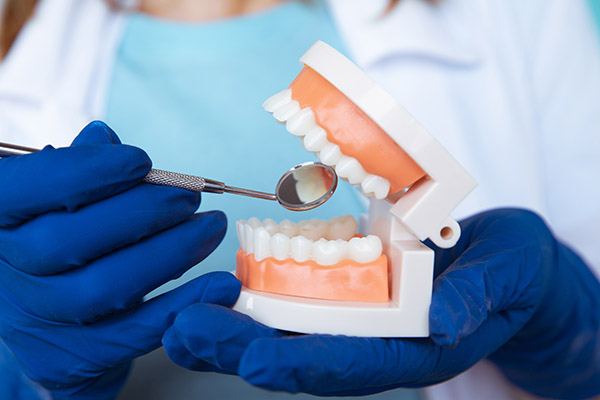 A dental crown is a type of dental restoration that covers a damaged or weakened tooth and improves its size, shape, health, and appearance. There are certain signs a dentist may look for to determine whether a dental crown is the best form of restoration for a patient or if another restoration may be more suitable.
A dental crown is a type of dental restoration that covers a damaged or weakened tooth and improves its size, shape, health, and appearance. There are certain signs a dentist may look for to determine whether a dental crown is the best form of restoration for a patient or if another restoration may be more suitable.
3 Times dental crowns may be recommended
There are numerous oral health concerns that a dental crown can treat. Some of the more common signs that a dentist looks for to determine if a dental crown is recommended include tooth decay, trauma to a tooth, and visible concerns that create a cosmetic issue for the patient.
1. Tooth decay
Tooth decay, also called dental cavities, occurs when the enamel wears down due to acidic reactions caused by bacteria. There are various ways in which a dentist can treat tooth decay, and the recommended method depends largely upon the location of the tooth, the severity of the damage, and the preference of the patient.
The signs of tooth decay include dark spots on teeth and tooth sensitivity. The most common ways in which tooth decay is treated are dental fillings, root canal therapy, and dental crown treatment. Dental crowns may be an option for minor to moderate decay. Dental crowns are often used after root canal therapy as well to protect teeth long-term.
2. Dental trauma
Dental trauma can occur when there is a blow to the mouth, such as when a ball strikes the mouth during a game of sports. Dental trauma can also result from teeth grinding together while sleeping at night, a condition which is known as bruxism. If dentists notice signs of dental trauma, then they may recommend dental crown treatment to restore the function, appearance, and health of the damaged teeth.
3. Cosmetic concerns
Dental crowns are most commonly used to improve oral health and protect a tooth that is more vulnerable to becoming lost or developing an infection without prompt care. However, there are times when ceramic crowns may be the best cosmetic treatment solution. Ceramic dental crowns, also called tooth-colored dental crowns, closely match the ideal shade of natural teeth and can be used to address issues such as tooth stains, teeth that are naturally too short, misshapen teeth, and more.
How to choose the right dental restoration for you
During the first visit with a dentist, they can assess the severity of the damage and explain in detail all available treatment options. The right choice depends on the patient’s budget and preference. The most common alternatives to dental crowns are dental veneers, dental bonding, and dental fillings.
Schedule a visit to determine if dental crown treatment is recommended
Here at our dental practice, we offer dental crown consultations to assess the severity and type of damage you may have oral health or cosmetic concerns about. We can explain in detail the pros and cons of each available type of restoration and help you make an informed decision about treatment.
Request an appointment or call R. David Brumbaugh, DDS at 214-306-4402 for an appointment in our Dallas office.
Related Posts
Dental crowns are durable and effective for restoring damaged or weakened teeth. They improve the tooth's structure and function while also enhancing your smile's appearance. However, proper maintenance can extend their lifespan and ensure long-term oral health. With the right care, these restorations can last several years, providing a reliable and aesthetically pleasing restoration.A consistent…
Dentists use dental crowns to preserve the integrity of the remaining natural dental structure. There are cases when cavities keep getting worse. Lack of routine dental checkups and poor dental care can lead to deeper cavities. This often leads to larger fillings with each dental check. If you want to know how dental crowns can…
Curious about whether you need a dental crown after a root canal? Read on to learn more. Many patients believe that a root canal is a painful procedure and therefore avoid it. In cases of seriously damaged or infected teeth, root canals are the last resort to prevent an extraction. After the root canal treatment,…


